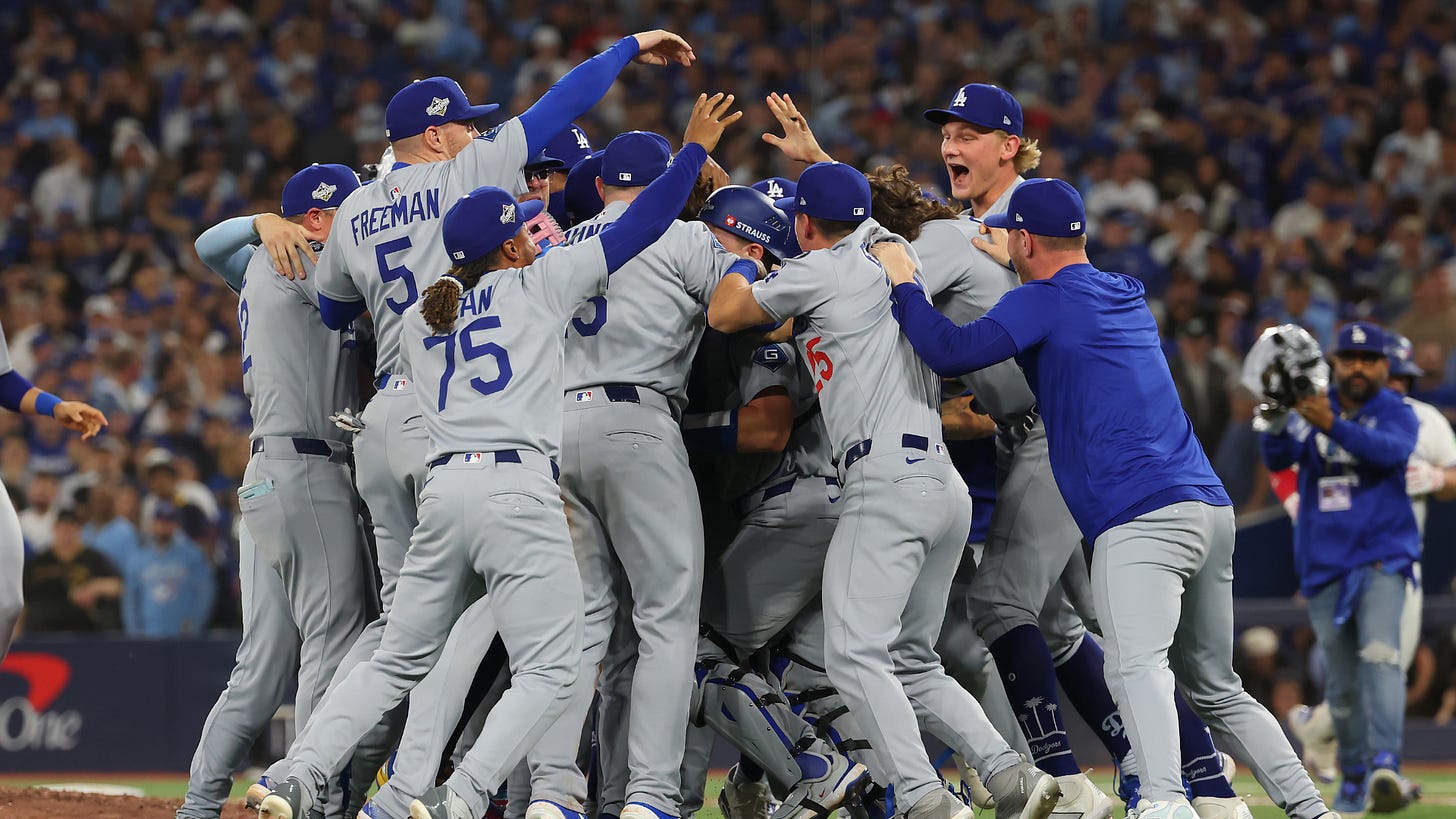The Numbers Remember: How the Dodgers Won a World Series for the Ages
They hit .203, won in 11 innings, and sent two legends into history. Baseball, once again, made no sense, and that’s exactly why it mattered.
They hit .203, won in 11 innings, and sent two legends into history. Baseball, once again, made no sense, and that’s exactly why it mattered.
The Dodgers hit .203 in the World Series, the worst mark by a champion since 1966.
Over the past two years, they’ve batted a combined .204 in the Fall Classic. And somehow, impossibly, they’ve lifted the trophy both times.
That’s not something you can model. You can’t quantify luck that persistent, or belief that steady. You can only call it what it is, destiny, wrapped in data.
Because for eleven innings in Game 7, baseball’s logic completely broke down.
The Dodgers trailed 4-2 heading into the eighth inning. Max Muncy, the veteran slugger who’s seen everything from heartbreak to champagne showers, pulled one into the right-field seats. Then came Miguel Rojas, a 36-year-old infielder with just 26 career home runs, turning on a 2-1 fastball and sending it deep into the night. Tie game.
In a sport obsessed with probabilities, that moment was pure impossibility.
By the eleventh, Will Smith made it eternal. One swing, one sound, one more banner for Los Angeles.
But the soul of this Series didn’t belong to Smith. It belonged to Yoshinobu Yamamoto, the pitcher who refused to stop showing up.
A complete game in Game 2.
Six innings of one-run ball in Game 6.
Two and two-thirds scoreless frames of relief in Game 7.
He didn’t just earn the World Series MVP; he redefined what it means to dominate October. Yamamoto wasn’t pitching on rest; he was pitching on resolve.
And then there was Clayton Kershaw, baseball’s quiet poet. In Game 3, he escaped a bases-loaded jam in extra innings, the final pitch of his career, and became the only pitcher in MLB history to end his story that way.
It wasn’t just an out. It was closure.
Across the field, Toronto put up a fight worthy of heartbreak.
The Blue Jays showcased their MLB-best defense: Daulton Varsho’s diving save in left, Guerrero’s full-extension snag near first, and Addison Barger’s double that died against the wall in Game 6. Ernie Clement set a postseason record with 30 hits, a number that would’ve been the headline in any other year.
And Max Scherzer, at 41 years old, became the oldest pitcher to start a Game 7, bending but never breaking as he gave the Dodgers five gritty innings.
Even the numbers had narratives.
Trey Yesavage went from making his first MLB start in September to taking the mound for Game 1 of the World Series, baseball’s fastest rise from unknown to unforgettable.
It was true for 18 innings in Game 3, true when Barger’s hit stopped inches short, and true again when Muncy, Rojas, and Smith each took turns rewriting probability.
And when it was over, the Dodgers weren’t just champions again.
They were something more permanent.
3 World Series titles in 6 years. 5 appearances in 9. 12 NL West crowns in 13.
The math screams dominance. The memories whisper something softer, legacy.
Because that’s what dynasties really are.
They aren’t built out of invincibility. They’re built out of impossible moments that somehow keep finding the same uniform.
The Dodgers have now done what no team has done in 25 years, repeat.
And they’ve done it in the most improbable way possible: with broken bats, aging arms, and a batting average straight out of the Dead Ball Era.
But baseball’s never cared about perfect. It cared about persistence.
And somehow, hitting .203 can still win you the world.
We’ll continue to wrap up the season over the next week at Sports Square, before shifting out focus to the NFL, NBA, and NHL.



